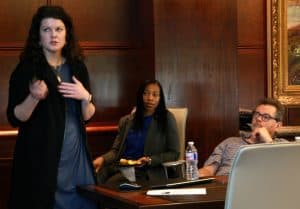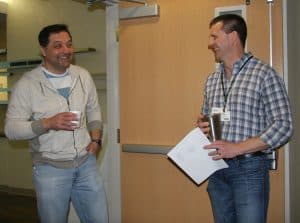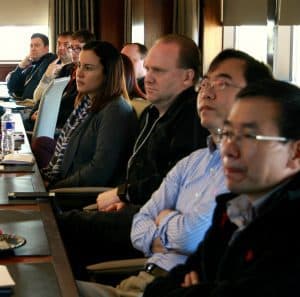Proteomics Workshop Facilitates Sharing Resources Across Nation
| April 12, 2017 | Technology? Check. Expertise? Check. Leadership? Double check.
The UAMS Proteomics Core Facility has been diligently amassing the technology needed to make it a leader in its field, which is studying the many functions of proteins. And now it’s taking that leadership role a step further by facilitating the exchange of ideas among core directors and staff from across the nation.
The first IDeA (Institutional Development Award) National Resource for Proteomics Workshop for Core Directors and Staff was held April 3-6 at UAMS. It featured training and networking opportunities and attracted 17 attendees from 11 states and Puerto Rico.

Ellen Jones, Ph.D., of NCTR, speaks to the proteomics core directors about protein-detecting technology and mass spectrometry imaging.
Alan Tackett, Ph.D. – co-director of the Proteomics Core, director of the IDeA National Resource for Proteomics and professor in the College of Medicine Department of Biochemistry and Molecular Biology – hopes to make the workshop an annual event.
“For proteomics, there’s really nothing else out there like this, and so it’s tremendously beneficial for us to share best practices and really learn how to synergize and share resources,” Tackett said.
The Proteomics Core is part of UAMS’ Core Facilities and Technical Services, where technology, tools and collaborative services are pooled together and made available on a pay-per-use basis to investigators both within and outside of UAMS who may otherwise not have access to them in their individual laboratories.
At the Proteomics Core, staff use mass spectrometry to help researchers identify proteins. The core is a one-stop-shop, where staff not only process the samples, but can help researchers design experiments and analyze results. It houses about $2.5 million in mass spectrometers.
Funding for the workshop came from a supplemental grant to the Arkansas INBRE (IDeA Network of Biomedical Research Excellence)program, which is directed by Lawrence Cornett, Ph.D., vice chancellor for research.
“Protein mass spectrometry provides methods that help investigators understand cellular mechanisms that underlie human disease processes,” Cornett said. “Keeping up with the rapidly evolving technology is a challenge, and this workshop gave participants from institutions in the IDeA network an opportunity to learn new analytical approaches that they will be able to offer the users of their proteomic core facilities.”
The IDeA National Resource for Proteomics, which organized the event, is a partnership between the Arkansas and Oklahoma INBRE programs, specifically the UAMS Proteomics Core and the Oklahoma Medical Research Foundation Multiplexing Protein Quantification Core.
Workshop participants came from the 23 IDeA states and Puerto Rico, which have been identified by the National Institutes of Health as receiving less grant funding for biomedical research than other states. The IDeA program aim to rectify this imbalance.
“There is a big push from NIH not to duplicate resources and to make better use of the resources already available, so that is a big component of this,” Tackett said. “We took what we do very well here – which is discovery-based proteomics – and we took what they do very well in Oklahoma – which is targeted proteomics, and brought those together, and now we provide that for everybody. So we’ve invested heavily in the high-end machines needed to do this work, and a lot of the other IDeA states don’t necessarily have all of the equipment that we do, but now they can access it through us. This is especially important for IDeA states, where resources can be more difficult to come by.”

Angel Ugrinov, Ph.D., of North Dakota State University, left, and Alan Tackett, Ph.D., of UAMS, chat between workshop sessions. Tackett helped organize the workshop and said that providing networking opportunities was one of the goals of the event.
Part of the purpose of the workshop was to familiarize researchers with the capabilities available at UAMS and the other states represented. Tackett said after the event that he had already been contacted by several researchers looking for collaborative opportunities.
“We’re getting it out there that UAMS is a national contender in the proteomics world,” Tackett said. “We’re showcasing the abilities that we have here that can help the IDeA states contribute to the advancement of science as a whole.”
Additionally, the workshop was intended as an opportunity for participants to learn about the latest advances in the field. Topics included sample preparation, data collection, bioinformatics and programming.
“There were a lot of people – not just interacting with us but interacting with each other – so the networking was huge as well and something that they all really appreciated and benefitted from,” Tackett said.
Looking ahead to next year, Tackett said that, based on participant feedback, organizers plan to include more information about informatics. There is also already talk of a spin-off symposium specifically about coding.
Other upcoming IDeA National Resource for Proteomics events include:
- Proteomics Faculty Workshop, May 24-26 at UAMS
- Proteomics Student Workshop, May 17-19 at UAMS
More information is available at http://idearesourceproteomics.org/.

